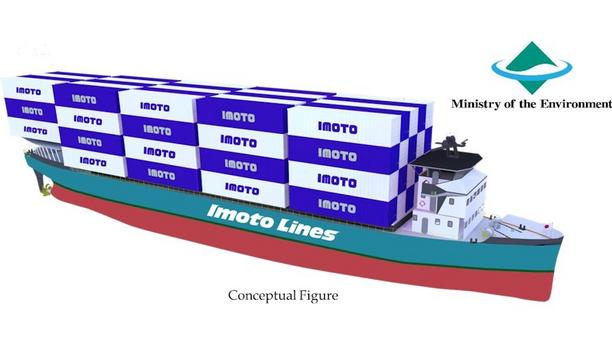Marindows Co., Ltd. - Experts & Thought Leaders
Latest Marindows Co., Ltd. news & announcements
Imoto Lines and Marindows, as a first step in transforming the future of domestic maritime shipping, will build the next generation of zero-emission domestic container ships capable of hybrid operation using Japan's first exchangeable container batteries, alongside onboard batteries, and generators, and conduct demonstration experiments on the Kobe-Hiroshima service. This project is a challenge towards a sustainable future for domestic maritime shipping, aimed at fundamentally solving the three major challenges the industry faces: decarbonisation, crew shortage, and safe navigation. The Ministry of the Environment, Government of Japan recognised its value and adopted it as a three-year project for the 'FY2024 Carbon Neutral Technology Research and Development Program'. Background & Objectives Achieve 'complete zero-emission' CO2 output over the entire lifecycle from fuel mining and manufacturing to usage, not just during operation Ship will gain full zero-emission from fuel mining and manufacturing to use For shippers operating globally, reducing CO2 emissions in the supply chain (Scope 3) is directly linked to international competitiveness, but the use of renewable energy in ships is just beginning to be developed. This ship will achieve complete zero-emission from fuel mining and manufacturing to usage, by being propelled by renewable energy charged in container batteries. Achieve 'complete zero-emission' CO2 output over the entire lifecycle Fundamental resolution to the industry's biggest issue: crew shortage The domestic shipping industry needs a fundamental solution to the dual shortage of crew numbers and skills. This ship will achieve safe and efficient navigation with fewer people and less skill/experience required through electrification, thorough standardisation and modularisation, and land-based support assuming standardisation. Cost reduction and value enhancement of next-generation advanced vessels Next-generation advanced vessels currently under development and introduction are not only expensive but also technologically nascent, carrying the risk of future technology obsolescence (devaluation of vessel value). This ship will significantly reduce operating costs through thorough standardisation, modularisation, and mass production, aiming to achieve total operating costs, including construction, that are approximately 30% higher than existing ships, but comparable when overall costs are considered. It also adopts a design that can be flexibly upgraded with the introduction of new technologies and systems, minimising the risk of technology obsolescence = ship obsolescence. Cost reduction and value enhancement of next-generation advanced vessels
e5 Lab Inc. (President: Michihiko Nakano), Marindows Inc. (President: Yasumasa Suetsugu), e-Mobility Power Inc. (President: Naoko Yotsuyanagi), CHAdeMO Association (President: Takafumi Anegawa), The Japan Ship Technology Research Association (Chairman: Seiichi Tanaka), Mitsubishi Shipbuilding Co., Ltd. (President: Toru Kitamura), and Development Bank of Japan Inc. (President: Seiji Jige) have established the "Promotion Council for Zero Emission Chargers for Ships (provisional name)" (hereafter referred to as "the Council"), aiming to promote the widespread use of standardised shore-to-ship power stations. Establishment of the Council In October 2020, Japan declared "carbon neutrality by 2050" and expressed its aim to "reduce emissions by 46% by 2030 compared to 2013 levels, and aim for even further reductions to 50%." In a joint declaration between Japan and the US in April 2021, both countries also agreed to cooperate on Carbon Neutral Ports (hereinafter referred to as "CNP"). International supply chain Intensive efforts towards decarbonisation in these port areas are seen as effective and necessary In island country Japan, port areas are pivotal in the international supply chain, with over 99% of exported and imported goods passing through them. These areas are also the heart of coastal industrial zones, where power plants, steelworks, chemical industries, and others, responsible for about 60% of the country's CO2 emissions, are concentrated. Intensive efforts towards decarbonisation in these port areas are seen as effective and necessary to promote Japan's carbon neutrality by 2050. Shore-to-ship power supply In this context, "shore-to-ship power supply," which involves supplying electricity from land to ships, is attracting attention as a concrete measure to reduce CO2 emissions. Approximately 40% of CO2 emissions in ports come from diesel generators on docked ships. Moreover, these generators not only emit CO2 but also cause a significant impact on the surrounding environment by emitting harmful substances such as "noise," "vibration," "PM," "NOx," and "SOx." Zero-emission chargers The Council has recognised the effectiveness of zero-emission chargers (onshore power) for ships It is demanded to stop harmful emissions from docked ships at the source through the development of onshore power infrastructure, leading to improvements in global and local environments. The Council, in line with the government's policy and as a world-first initiative involving the member companies, has recognised the effectiveness of zero-emission chargers (onshore power) for ships to promote decarbonisation in maritime and port areas and the expansion of renewable energy use and has united in purpose. Goals the Council aims to achieve In the Council, taking into account the various issues in the ship power supply business in the early stages of EV ship diffusion, the participating members will play their respective roles and through an All-Japan collaboration centered on the seven companies mentioned above, its aim to develop and maintain a strategic ecosystem for zero emission chargers for ships, and to strategically engage in efficient operations and effective utilisation. This will lead to improved user convenience, an increase in the number of ships using the service, the independence of the ship power supply business, and the further development of chargers. Ultimately, this will realise zero emissions from ships in port areas, the spread of EV ships, the expansion of renewable energy use, and improvements in global and local environmental issues. Business plans The Council will install prototype standardised universal zero emission chargers for ships For the first phase, by fiscal 2025, the Council will install prototype standardised universal zero emission chargers for ships in Hanshin Port and Keihin Port, which are international strategic ports where domestic and foreign freight and ships are concentrated. The Council will then expand these chargers to ports, fishing ports, and marinas nationwide, and overseas. Moreover, the City of Kobe, Port, and Harbor Bureau, and the City of Yokohama, Port, and Harbor Bureau are participating in the Council as observers. Specific initiatives 1) Development of a standard universal zero-emission charger system for ships. The system will consist of three elements and will be a standardised specification that transcends company boundaries. An onshore power station (standardised charger and billing system). Shipboard power receiving module (standardised and modularised hardware and software). High-capacity communication between ship and shore (standardised high-capacity communication system within the port). 2) Surveys and recommendations on the establishment of standards and rules. 3) Creation of social implementation projects to promote diffusion. 4) Information collaboration between participating companies. 5) Mutual utilisation of zero-emission chargers between participating companies. 6) Public relations and promotional activities to promote the diffusion of zero-emission chargers. 7) Cost reduction through joint procurement. 8) Content creation for “Zero Emission Charger × X”. 9) Building a sustainable ecosystem, including reuse.
Mitsubishi Shipbuilding Co., Ltd., a part of Mitsubishi Heavy Industries (MHI) Group, has completed investment into Marindows Inc., a Tokyo-based firm, aiming to utilise the revolution in information technology to build an integrated digital platform for the marine industry. Amid the current energy revolution, this partnership will accelerate efforts to achieve a carbon neutral world in areas from electrification and autonomous operation to the marine industry, create new value by merging the physical and digital, and establish a ‘win-win’ relationship with substantial benefits for both companies. Electrification and autonomous operation Electrification and autonomous operation in the coastal vessel industry has become increasingly widespread, particularly in the small and mid-sized vessel market. This investment will provide a network with the small and mid-sized coastal vessel market, fishing boat market, and pleasure boat market that will support Mitsubishi Shipbuilding’s efforts for the commercialisation of standard electric propulsion vessels, and furthering the adoption of a safe and efficient navigation support system, utilizing real-time data. Investment in Marindows Inc. Marindows has adopted a vision to utilise the revolution in information technology to solve the issues of safety Marindows Inc. was established in March 2021 by e5 Lab Inc., a firm jointly founded by four companies representing shipping firms and a trading company to promote the electric propulsion and digitalisation of ships. Marindows has adopted a vision to utilise the revolution in information technology to solve the issues of safety, productivity, and environmental conservation facing the marine industry, and transform the marine sector into one of the leading growth industries of the 21st century. ‘Marindows’ marine operating system The company aims to create a better work environment for crews and all personnel in the marine industry, by providing a range of applications that use the ‘Marindows’ marine operating system, which it provides as a platform. The launch of marine broadband in 2022 is expected to make possible for ships to shore communications and crew support services in real time, which up to now had been unattainable, because of the unreliability of such communications. Mitsubishi Shipbuilding Co., Ltd. Mitsubishi Shipbuilding Co., Ltd. has built more than 5,000 vessels, including passenger ships, ferries, oceanographic research vessels and patrol boats, and has actively adopted new technologies as a pioneer in the construction of energy carriers, including coal carriers, oil tankers, and liquified gas carriers (LPG and LNG carriers). In recent years, as a marine systems integrator generating innovation in the marine-related engineering and services business, Mitsubishi Shipbuilding has been pursuing initiatives that go beyond the conventional shipbuilding business model of just building and selling products. MARINE FUTURE STREAM vision for 2050 Through this investment, Mitsubishi Shipbuilding will continue to respond to the demands of customers and society Through this investment, Mitsubishi Shipbuilding will continue to respond to the demands of customers and society, and work toward solutions to achieve its ‘MARINE FUTURE STREAM’ growth strategy. Mitsubishi Shipbuilding Co., Ltd. has established the MARINE FUTURE STREAM vision for 2050 in the ship and marine sector, setting the goals of ‘effective utilisation of the marine space’ and ‘a decarbonised marine world’, and working to generate ideas for marine-related innovation and achieving them through back-casting. Focus on the decarbonisation of ships For the effective utilisation of the marine space, in order to establish a safety society in which people work comfortably with the sea, and everyone is able to live well, and with peace of mind, Mitsubishi Shipbuilding will utilise digital technologies and service businesses that extend beyond the confines of shipbuilding, to establish a sound material-cycle society. For ‘a decarbonised marine world’, in order to focus on the decarbonisation of ships, as well as the use of renewable energy and CO2 capture at sea, Mitsubishi Shipbuilding will pursue the decarbonisation of society through the marine business.
Fleet planning as a strategic asset
Download



